‘Broke as a Joke’: Who’s Staying, Who's Fleeing Hollywood After Fires
The infernos as final straw: Where some workers are moving for jobs, as others #StayinLA: 'When the cave's collapsing, you don't keep trying to find gold'

Elaine Low writes about the TV business from L.A. She recently wrote about the #StayinLA campaign to keep production in SoCal, broke down the indie TV model and reported on the unscripted market as well as what scripted shows are being bought by HBO and Max, Netflix, Prime Video, NBCU and Peacock, ABC , Disney+ and FX, Apple TV+ and CBS, Paramount+ and Showtime. As a paid subscriber to Series Business, you’ll receive dispatches from Elaine, Lesley Goldberg and Manori Ravindran on the TV business. This is a standalone subscription separate from The Ankler. For access to Series Business and everything The Ankler publishes, including Sean McNulty's The Wakeup and Richard Rushfield, subscribe here.
Amid warm Miami breezes and slickly produced chatter about the future of TV, NATPE Global still had Los Angeles on its mind last week as the city recovers from disaster.
It was jarring, one European executive told me during the international content confab, that in the first days of the fires, his L.A. colleagues forged ahead with meetings despite the city being an open wound. Americans, was the tacit headshake. Working even through wildfire.
Back here in L.A., one crew person tells me she continued to go to set not far from the Palisades through the peak of the inferno, then spent a day vomiting from the aftereffects of smoke inhalation. But when jobs are scarce and you care about the work, sometimes it feels like there’s no other choice but to keep showing up.
Last week, I wrote about the #StayinLA campaign that’s urging California officials and studios to keep more TV and film production in the county. That change can’t come soon enough for those who are struggling now.
Take producer Brooklyn Wilde, who says 2021 and 2022 were “probably the hottest years” of their career. After a decade as a freelance worker in the industry, they had started producing independently full time, making music videos “for bands I listened to in high school, so that felt like a particularly amazing accomplishment.” For the first time, their income crossed the six-figure mark.
Then the strikes happened, and Wilde’s career hit the same extended pause as everyone else’s. Their income dove to poverty level, they tell me, and even their housing situation became unstable. Wilde had moved into a temporary sublet until Jan. 15, after which they were going to figure out where to sign a lease next. But just a week before that sublet expired, disaster struck the city, resulting in rent spikes and price gouging that have made finding a new place seem nigh impossible. Even for Angelenos at high end of the income spectrum, finding their next place to live has become a desperate frenzy, as my colleague Nicole LaPorte reported last week.

So on Jan. 12, less than a week after the devastating Palisades and Eaton wildfires broke out, Wilde packed up all their belongings, stuffed them in storage, and decided to “just hit the road for a while,” they say. “Metaphorically, my home had been on fire in the months before the fires even started.”
Los Angeles is beset by crises inside and outside the entertainment industry: a housing shortage that has only intensified since the pandemic, and a production slowdown that threatens the city’s creative class and Hollywood’s very identity. The wildfires amplified both. As I’ve previously reported, around 8,000 of the 45,000 IATSE members in L.A. County live — or lived — in evacuation zones. More than 300 of those crew members lost their homes to the infernos, as have dozens who work at Disney, Universal and other major studios.
I spoke to Wilde and several others from different lanes of entertainment about how the Palisades and Eaton fires have reframed their thinking about living and working in L.A. Some were directly impacted by their fires, others are lucky to still have their homes but ready to leave them nonetheless. For who knows how many in Hollywood, after five years marred by plague, shrinking studios, strikes, you name it, they are done with the city. For some, even if their homes weren’t directly impacted, the fires were the last straw. But others have vowed to stay and rebuild.
Here’s what they shared with me and what it means for the future of entertainment workers in L.A.:
Why a former writer for an Emmy-darling hit chose to pull up stakes for New York
The other city where “anyone who’s worth a shit is working” as production jobs in the L.A. area dry up
The grim evolution of industry Facebook groups where workers increasingly share their personal challenges
The communities giving some creatives hope for life and work in L.A.
Why SoCal natives and industry veterans see the fire impact differently than newer arrivals to Hollywood




